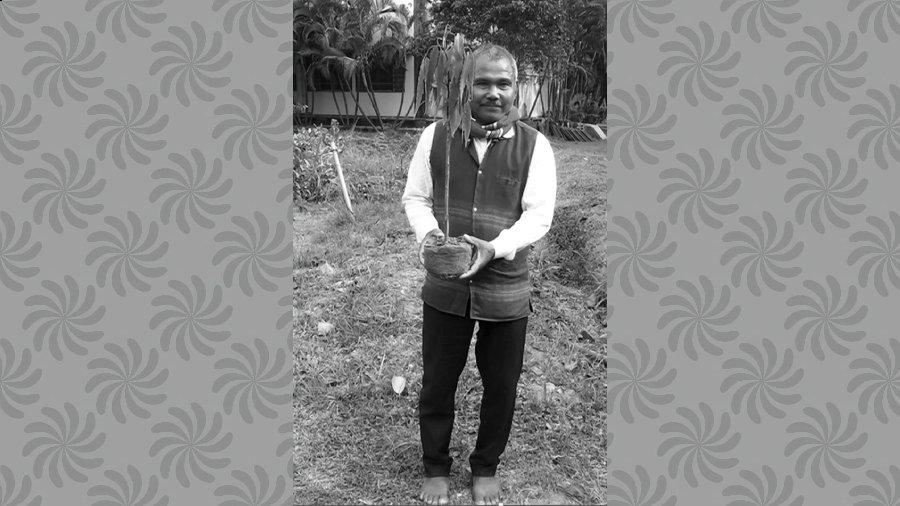He was nicknamed Molai, which means radish in Assamese, because he was a pink-cheeked child and his great contribution to nature was discovered when a marauding herd of elephants decided to seek shelter near his home on Majuli island in the Brahmaputra river, near Jorhat in Assam.
This was 2008.
When the forest department came looking for the elephants, they discovered a 1,300 acre forest on what they knew to be a sandbar, complete with its own wildlife — elephants, deer, a variety of birds including vultures, rhinos, monkeys, leopards, tigers. It has since been named Molai Forest in honour of Jadav Molai Payeng, environmentalist and marginal dairy farmer.
I meet Payeng at Praxis Business School in the southern outskirts of Calcutta, where he had a TED Talk scheduled. It takes me a while to understand his language, the Hindi he speaks is nothing like the one I am used to. Ahan, the student assigned to interpret Payeng’s Assamese — should he feel the need to use it — has to initially interpret his Hindi for me.
Payeng smiles patiently through the process and shows great animation when I finally understand. He tells me that he speaks in Assamese at international events. “It’s not like they will understand Hindi,” he reasons.
“Dharti ko bukhar hua tha... The earth had fever,” he says when the talk, as most talks do these days, turns to the pandemic. The global lockdown managed to make her better, he adds, explaining how biodiversity boomed in the first nine months and a seasonal lake in Molai Forest became permanent. There are PhD students from Pune as well as universities abroad who are studying the changes.
While the lockdown wasn’t called to provide reprieve to Mother Nature, that is just what it did. “Even in the Kaziranga forest, officials have noticed robust growth during that period.”
This has given Payeng an idea. “We should call for a seven-day lockdown every year so that Earth gets time to recover from the damage we do,” says the man who smiles often and easily, gestures more with his head than his hands. And when he talks about forests, his face lights up.
Payeng was only 16 when he planted 20 trees and bamboos in an area being steadily eroded by the mighty Brahmaputra. In answer to my question on whether he planted all the vegetation in Molai Forest, Payeng says something lyrical. “The animals know to plant, the birds know to plant, the Brahmaputra knows to plant, even the air knows to plant; it is only man who knows just to cut,” he says, explaining that he was only responsible for the large trees in the forest and even then not for all of them.
Then he makes a disclosure: growing the forest has not been without a personal cost. Payeng has lost 85 cows, 95 buffaloes and 40 pigs to hunting tigers and leopards. He does not blame the big cats but the humans who encroach into forests. “We need to live in harmony with them,” says the man whose main source of income is from the milk he sells.
Payeng is now putting his learning — hands-on, he emphasises — into growing more forests. There are the 2,000 acres adjacent to Molai Forest, wherein two NGOs have already put in a lakh trees each and more have made promises. If things go as planned, says Payeng, this area will become a forest in only 10 years.
Then there is the reforestation he is helping with in Brazil. “The last time I was there, I told them to develop only native seedlings. That work is done so this time if I can go at the end of the year, the planting will start,” says Payeng, who is also helping develop a forest in Dubai. There are other forests he is helping develop around Jorhat, in Dhubri, in Sunitpur.
“India will lead the world in greening the environment. After all, 30 per cent of scientists across the world are from India,” says Payeng .
He does have one complaint though. “Biologists know the scientific names of trees but they can’t recognise those trees if they come across them. If they do not know, how will they teach their students?”
His solution? There should be an environmental university in every state. “Its responsibility will be to study the local biodiversity and document it. Practical knowledge is important. Otherwise we will lose species of native trees and not even know about it,” he says.
Payeng is confident that climate change can be countered if we manage to turn all barren area in India green. “We just need a change in attitude. Instead of cutting cake on a child’s birthday, plant a tree. Mark your wedding by planting a tree.” Every person should plant a tree, believes the Forest Man of India. He says, “Plants give us food, drink, clothes, the air we breathe. If they are not god, what is?”
Têtevitae
1963: Payeng is born into the Mising tribe of Assam
1979: Plants the first trees in what would become Molai Forest. Is also involved in social forestry in Golaghat
2007: A journalist-photographer stumbles upon Payeng seeding his forest and writes a feature on him
2012: JNU vice-chancellor Sudhir Kumar Sopory dubs him the Forest Man of India at a function to felicitate him on the occasion of Earth Day
2015: Is invited to the United Nations Climate Change Conference at Paris; awarded the Padma Shri October that year
2021: A trilingual film based on his life — the Hindi version called Haathi Mere Saathi and released straight to video — featuring Rana Daggubati is released











